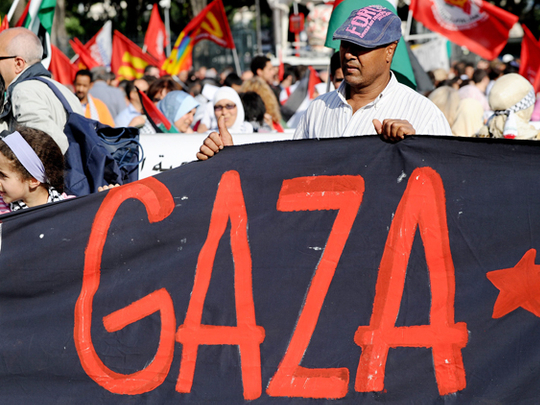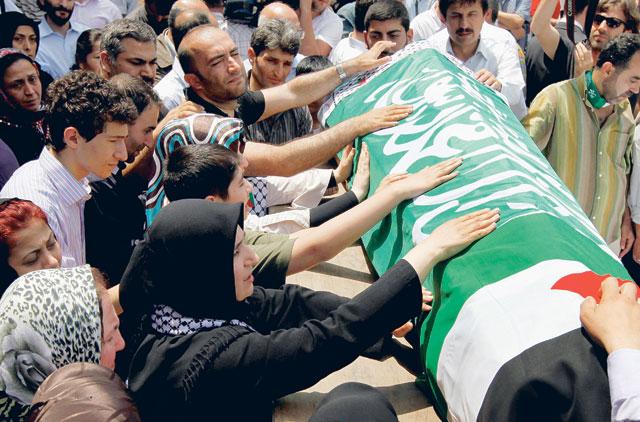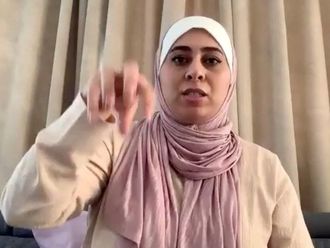
Muscat: As the Israeli commandos started advancing, we had to move a floor down. The floor there was covered in dark red footprints of different sizes.
Bleeding men had been placed in the centre of the floor being looked after by on board doctors and a couple of volunteers each, one of whom was constantly wiping the blood around them.
I filmed the injured in horror, pausing for a second to wonder if it was appropriate, and eventually deciding that I should film. I asked a passerby if any had lost their lives, and was told, "Three so far".
That was a shock. I kept thinking that this was not how I had expected events to unfold. That thought was distressing as I had prepared myself psychologically for the most extreme circumstances in advance — but not death. I had an uneasy sense of not knowing what to expect.
I could hear the Israelis coming close. They were on the floor above and I assumed that they had taken control of the press room. As they were expected to come down to the floor where all the civilians had been taking shelter, everyone was shoved into the seating room that had been used as makeshift sleeping quarters.
There, in front of the cafeteria window, lay three corpses with their faces uncovered. I just stared with an emotionless face as weeping friends paid their last respects. Most of the others too, were in a state of shock. A few men formed a makeshift curtain around the corpses as others took the blood-drenched clothes off the dead to drape their bodies in clean Palestinian flags.
Chilling
I walked further into the hall, only to find that Israeli soldiers had stationed on the deck outside, pointing their guns through the windows at the civilians outside. That was the first time I saw the armed Israeli presence on board, and it was chilling.
Through the window I could see a man of slight build nervously wielding a gun, his hand on its trigger. He must have been in his late teens, so young that some of those around us argued that it was a female soldier.
Every Israeli that boarded the ship, from the army and the commando units, wore ski masks with only their eyes exposed for the civilians to gauge his level of fear, anger or anxiety.
Beyond the window, the soldier gestured with his gun for the civilians to lower their heads. Most obliged. Those who did not got a laser beam pointed in the centre of their foreheads.
A tall and stout Bahraini man with a long beard and a short dishdasha proved to be a difficult hostage. Sitting on the U-shaped sofa closest to the window beyond which the soldier was pointing his gun, he sat comfortably facing the nervous soldier.
The boy gestured with his gun for the Bahraini to lie down. By this time, he was the only one sitting. The Bahraini, unmoved, continued as if oblivious to the presence of Israeli soldiers who were armed to the teeth.
The soldier continued his gesturing, thumping the window with his fist, and when he failed, he resorted to the laser beam. The beam landed in the centre of the man's forehead but he was undeterred. A few minutes later, seemingly annoyed at the beam, the man got up, and moved across to the other side of the U-shaped sofa with his back now facing the young soldier. The soldier gave up. A few minutes later, everyone was sitting.
Then the announcements on the ship started. Lubna Masarwa, an official from the Free Gaza Movement, addressed the Israeli soldiers, saying the ship had surrendered and its passengers would not confront the army. "You have blood on your hands. Four have died and we have many more critically injured. They need help," she shouted.
She must have repeated the message at least ten times in English, then a few times in Hebrew. No response.
Read part 1 of the eyewitness account
Read more stories on the Freedom Flotilla
Knesset member
After about half an hour, Knesset member Haneen Zoubi, armed with a white handkerchief, a message on a large piece of cardboard and her parliamentary immunity, risked her life to walk straight to the window. The soldier nervously raised his weapon and gestured for her to stop. She went ahead, stood there for a few seconds to ensure that the message was read, and walked back.
No response. The sun was up by then.
The announcements by Masarwa continued. Then, a British woman wrapped herself in the Union Jack and made the same move.
Approximately an hour and a half after the first call for help, a soldier shouted through the window in a heavy Hebrew accent: "Injured only! One by one!".
Slowly the injured were carried out. I was asked to help carry some, which led me to the second sitting hall on the floor where the injured were being treated.
I was shocked to see row after row of injured people lying down and waiting for help, some slowly losing consciousness.
About an hour later, after the injured had been unloaded, the Israelis told us to start moving towards the door at the back of the room. One by one we came out, with men being strip searched down to their underwear in full view of the women, then their hands tied with plastic handcuffs, some behind their backs and others in front.
We were pushed and shoved by the male and female soldiers, who kept saying "yalla" in poorly pronounced Arabic, and then ordered to march to the top deck where we were made to sit on the floor for the next four hours.
By one o'clock, in the heat of the scorching Mediterranean sun, the soldiers decided to move us back downstairs, saying we will now be allowed to go to the washrooms one by one. Downstairs, on each four-person sofa, the Israelis squeezed in eight people for the next nine to ten hours, all with their handcuffs intact.
The air conditioning was down and for the rest of our time on the ship we were packed like sardines; hot, sweaty, smelly and hungry, wondering when we'd reach the Israeli port of Ashdod. Some managed to pick up any food item lying around, open the wrapping with their teeth and distribute it. Most had not slept or eaten the whole time.
Any movement by the passengers resulted in an Israeli gun being pointed in their direction — except during prayers. Soldiers often tried to stop people from praying but that was one order most passengers will not take, and the soldiers eventually decided to tolerate it.
Throughout the long wait, only one person defied the Israeli soldiers successfully. That was Knesset member Haneen Zoubi. The petite woman was seen shouting in the soldiers' faces in Hebrew at times and trying to reason with them at other times. While everyone else was forbidden from moving, Haneen freely marched through the ship, reminding passengers of their rights and telling them to act in a unified manner.
By 11pm we were unloaded at Ashdod port, to see a sea of Israeli officials, mostly teenagers, waiting outside the tent that served as a makeshift interior ministry office, as they stared at handcuffed humanitarian relief workers who had been dragged to their country against their will from international waters.
Read part 1 of the eyewitness account
Read more stories on the Freedom Flotilla
Read Gulf News on Sunday to learn about Abbas' detention and eventual deportation












